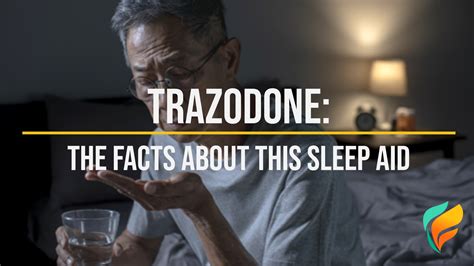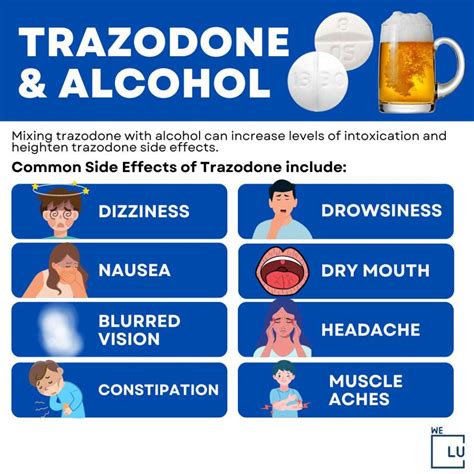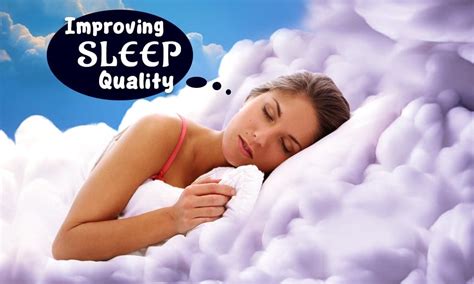Intro
Trazodone 50mg helps with insomnia and sleep disorders, promoting relaxation and improving sleep quality as a prescription sleep aid, also used for anxiety and depression treatment.
Sleep disorders have become a pervasive issue in modern society, affecting millions of people worldwide. The search for effective sleep aids has led to the development and prescription of various medications, including trazodone. Trazodone, an antidepressant, has been increasingly used off-label as a sleep aid due to its sedative properties. In this article, we will delve into the specifics of using trazodone 50mg for sleep aid, exploring its benefits, working mechanisms, potential side effects, and practical considerations for those considering this medication.
The importance of addressing sleep disorders cannot be overstated. Chronic sleep deprivation can lead to a range of health issues, including cardiovascular disease, diabetes, and mental health disorders. The economic impact is also significant, with lost productivity and healthcare costs associated with sleep disorders amounting to billions of dollars annually. Given these stakes, finding an effective and safe sleep aid is crucial for improving the quality of life for millions of people.
Trazodone's use as a sleep aid is somewhat of a departure from its original purpose. Initially developed as an antidepressant, its efficacy in treating major depressive disorder is well-documented. However, its sedative effects, particularly at lower doses, have made it an attractive option for patients struggling with insomnia or other sleep disorders. The 50mg dose is often cited as a starting point for sleep aid, as it is believed to provide sufficient sedation without the full range of antidepressant effects seen at higher doses.
How Trazodone Works for Sleep

Trazodone's mechanism of action as a sleep aid is multifaceted. It operates by influencing various neurotransmitter systems in the brain, including serotonin, which plays a crucial role in regulating mood and sleep. By inhibiting the reuptake of serotonin, trazodone increases the availability of this neurotransmitter, which can lead to a sedative effect. Additionally, trazodone has been shown to block histamine receptors, further contributing to its sedative properties.
Benefits of Trazodone for Sleep
The benefits of using trazodone for sleep are several. It is generally well-tolerated, especially at the 50mg dose, and can be effective for both falling asleep and staying asleep. Trazodone's use as a sleep aid also avoids the risk of dependence and withdrawal associated with traditional sleep medications like benzodiazepines. Furthermore, because it is not specifically approved for sleep, it can be prescribed off-label, offering an alternative for patients who have not found relief with conventional sleep aids.Potential Side Effects and Considerations

While trazodone can be an effective sleep aid, it is not without potential side effects. Common side effects include dizziness, dry mouth, and nausea. More serious but less common side effects can include increased risk of suicidal thoughts, especially in younger patients, and serotonin syndrome, a potentially life-threatening condition caused by excessive levels of serotonin in the body.
Practical Considerations for Taking Trazodone
For those considering trazodone as a sleep aid, several practical considerations must be taken into account. First, it is essential to consult with a healthcare provider to discuss the potential benefits and risks. Trazodone should be taken as directed, usually once daily, and it may take a few days to notice its effects. Patients should also be aware of potential interactions with other medications and avoid alcohol consumption, as it can exacerbate side effects.Steps to Improve Sleep Quality with Trazodone

Improving sleep quality while taking trazodone involves several steps:
- Establish a consistent sleep schedule to help regulate the body's internal clock.
- Create a sleep-conducive environment, such as keeping the bedroom cool, dark, and quiet.
- Avoid stimulating activities before bedtime, such as watching TV or using electronic devices.
- Engage in relaxing bedtime routines, like reading or meditation, to signal the body that it is time to sleep.
Statistical Data on Trazodone's Efficacy
Studies have shown that trazodone can be effective in improving sleep quality. For instance, a meta-analysis found that trazodone significantly improved sleep efficiency and reduced symptoms of insomnia compared to placebo. While individual results may vary, the data suggest that trazodone can be a valuable option for those struggling with sleep disorders.Alternatives and Complementary Therapies

For patients who do not find relief with trazodone or prefer not to use medication, several alternatives and complementary therapies are available. Cognitive-behavioral therapy for insomnia (CBT-I) has been shown to be highly effective in addressing underlying sleep issues. Other options include melatonin supplements, which can help regulate the sleep-wake cycle, and mindfulness practices, such as yoga and meditation, which can reduce stress and improve sleep quality.
FAQs About Trazodone for Sleep
What is the typical dose of trazodone for sleep aid?
+The typical starting dose for sleep aid is 50mg, taken once daily, but this can be adjusted based on individual response and tolerance.
Can trazodone be used long-term for sleep?
+While trazodone can be used long-term, it is generally recommended to use it for the shortest duration necessary to minimize the risk of side effects and dependence.
Are there any potential interactions with other medications?
+Yes, trazodone can interact with several medications, including other antidepressants, blood thinners, and certain medications for seizures. It is crucial to inform your healthcare provider about all medications you are taking.
Final Thoughts on Using Trazodone for Sleep Aid

In conclusion, trazodone 50mg can be an effective and relatively safe option for those seeking a sleep aid. Its sedative effects, combined with its relatively low risk of dependence, make it an attractive alternative to traditional sleep medications. However, as with any medication, it is crucial to weigh the potential benefits against the risks and to consult with a healthcare provider before starting treatment. By understanding how trazodone works, its potential side effects, and practical considerations for its use, individuals can make informed decisions about their sleep health.
We invite readers to share their experiences with trazodone or other sleep aids, and to ask any questions they may have about improving sleep quality. Your feedback and engagement are invaluable in helping us provide the most accurate and helpful information possible. Whether you're considering trazodone or exploring other options for addressing sleep disorders, remember that seeking professional advice and prioritizing your sleep health are key steps towards a healthier, happier life.
